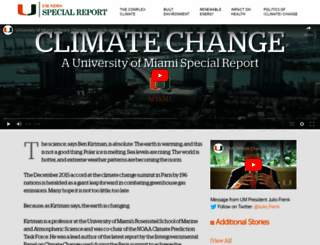Climate Change - a special report from the University of Miami
Page Load Speed
1.7 sec in total
First Response
83 ms
Resources Loaded
1.2 sec
Page Rendered
395 ms

About Website
Click here to check amazing Climate Miami content for United States. Otherwise, check out these important facts you probably never knew about climate.miami.edu
The University of Miami examines climate change through the lenses of daily life, politics, health, the built environment, renewable energy and more.
Visit climate.miami.eduKey Findings
We analyzed Climate.miami.edu page load time and found that the first response time was 83 ms and then it took 1.6 sec to load all DOM resources and completely render a web page. This is quite a good result, as only 35% of websites can load faster.